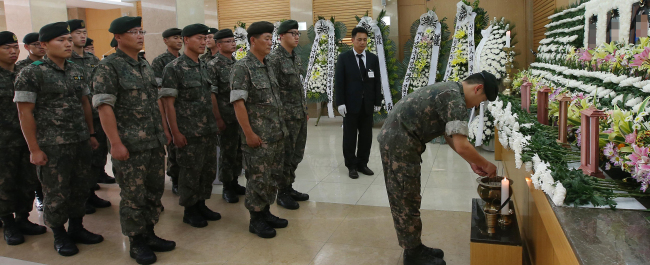Outmoded military culture is facing growing criticism as bullying is being cited as a possible cause of last week’s shooting spree that killed five soldiers and wounded seven others in an eastern border unit.
Despite the Army’s efforts to stamp out bullying and other abuses in the barracks, observers say that such wrongful acts are still taking place in the military, particularly in border units where a strictly hierarchical culture prevails.
“There are still those who we can call outcasts in the military. Those, who are designated as ones in need of extra supervision, are likely to become outcasts,” said Song Hyeon-min, a senior official at an activist group, called the Center for Military Human Rights Korea.
 |
Soldiers pay respects at a memorial altar for the five soldiers who were killed in a shooting rampage in a border unit of the Army’s 22nd Division on Saturday, at a military hospital in Seongnam, Gyeonggi Province, Tuesday. ( Yonhap) |
“The problem is that the military tends to think that it is merely a personal problem, shifting the responsibility for them being treated as outcasts to the soldiers, themselves rather than delving into any organizational problems or problems with the military culture itself.”
The 22-year-old sergeant who went on the shooting rampage last Saturday, was reportedly bullied by his senior and junior colleagues. He might have been stressed out particularly when his junior fellows did not recognize him as being senior to them, observers said.
In frontline units where discipline is critical, maladjusted soldiers are likely to be treated as “invisible men,” or ostracized, some observers said, although the military has tried to wipe out abuses in border barracks following a set of shooting incidents.
Bullying was also cited as a primary cause of a shooting incident in July 2011. A Marine corporal went on a shooting rampage at a barrack on Ganghwado Island off the west coast, killing four soldiers. During an investigation, the corporal indicated that bullying led to the shooting.
After the shooting rampage, the Defense Ministry crafted a set of guidelines to improve the outdated military culture. The guidelines banned draftees from giving any orders among themselves, or beating or abusing fellow soldiers.
In 2005, the ministry also announced a set of measures to improve military culture when a soldier in the Army’s 28th Division in Yeoncheon, Gyeonggi Province, fired at his comrades, killing eight people.
Human rights activists argue that the military should draw up more effective measures to enable abuse victims to speak out about their suffering resulting from abuse by their comrades. They also said that there should be outside observers who can watch human rights situations in the military.
“There is a counseling program in the military. But the program is not well-organized and professional (compared with civilian counseling programs), which is one problem that needs to be addressed,” said Song of the CMHRK. “It would also be advisable for the military to introduce a civilian ombudsman program to keep watch on human rights situations to help those with difficulty adjusting to military’s life.”
The main opposition New Politics Alliance for Democracy said that there should be a fundamental change to prevent maladjusted soldiers from committing violent acts like past shooting sprees, which seriously damaged troop morale.
“Despite the military efforts to improve the military culture, the change is not keeping up with the speed of the changes in our society at large,” said Park Young-sun, the party’s floor leader during the party’s policy meeting.
“There should be a new program to properly deal with and help those maladjusted soldiers.”
By Song Sang-ho (
sshluck@heraldcorp.com)






![[Herald Interview] 'Trump will use tariffs as first line of defense for American manufacturing'](http://res.heraldm.com/phpwas/restmb_idxmake.php?idx=644&simg=/content/image/2024/11/26/20241126050017_0.jpg)
![[Exclusive] Hyundai Mobis eyes closer ties with BYD](http://res.heraldm.com/phpwas/restmb_idxmake.php?idx=644&simg=/content/image/2024/11/25/20241125050044_0.jpg)
